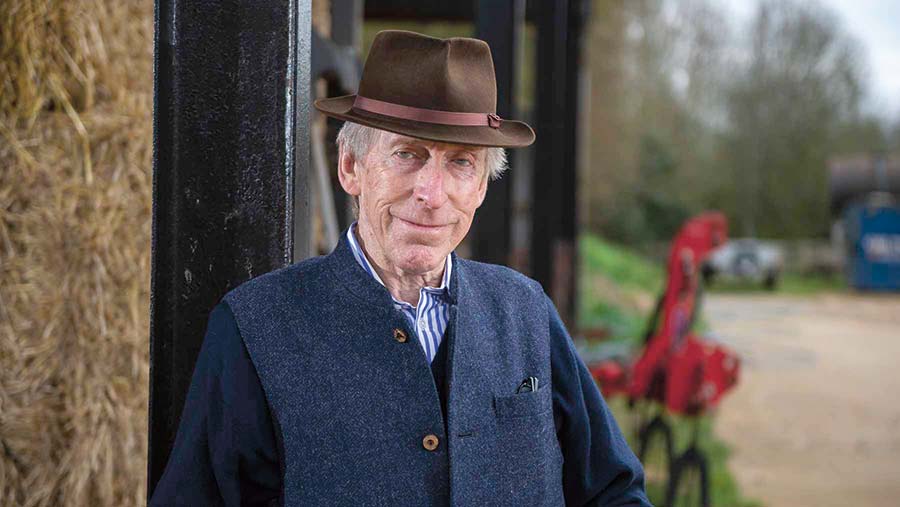Farmer ‘outraged’ by incorrect charge for water disposal
 Jeffrey Warhurst © BillyPix
Jeffrey Warhurst © BillyPix An Oxfordshire farmer has expressed his outrage following a three-year battle with two water companies over incorrect charges for the disposal of water given to livestock and sprayed on crops.
Jeffrey Warhurst, who had 170 pedigree South Devon cattle before a dispersal sale last year and whose 364ha is now all arable, realised in 2016 that Severn Trent had made the assumption that every gallon of water purchased was returned to the sewer.
“I was paying £1 for every cubic metre as a used water charge, but in reality only 5% of the water was used in the house and returned to the sewer, with 95% used for livestock and crop spraying,” said Mr Warhurst.
See also: 6 tips for improving short-term farm finances
During a long period of correspondence with Severn Trent, involving dozens of letters and phone calls, a subsidiary company called Water Plus was created, which took on responsibility for billing customers.
In order to continue his complaint, Mr Warhurst had to communicate with both companies, which he said made the process seem disjointed and more frustrating.
Monthly refund
Having finally procured acknowledgement that he was owed a refund, Mr Warhurst was then told by Severn Trent that, in order to obtain his credit, he must provide the company with proof of how much water is eligible for the used water charge each month.
To do this, Mr Warhurst had to install a private house meter at his own expense, so he can compare it with the mains meter, establish how much water has entered the sewer, send the readings to Water Plus and then receive his monthly refund.
He has had to resort to sending the details by Royal Mail Special Delivery at a cost of £7 each time to ensure the correct department receives and accepts them. The credit is paid about 25 days later and three-quarters of the historic refund has been paid.
“The credits due to me amount to £2,000 a year and it is outrageous that the onus of recovery is entirely down to me,” said Mr Warhurst.
“They’ve had two years of details from me now, so they can see I’m owed 95% back each month.”
Range of issues reported
Paul Hammett, NFU water specialist, said he was aware of a number of farmers across the country who are dealing with similar issues.
“Such has been the level and range, from used water charges to metering issues and incorrect bills, that over the past 12 months we have set up regular meetings with Water Plus and Severn Trent in an attempt to try and resolve some of the representative cases,” he said.
“We have resolved a range of individual customer cases and built a relationship with the new retail market, but it is still very much a work in progress.”
Alice Ritchie, the CLA’s land use policy adviser, said putting bureaucracy and unfair burdens on farmers is a big problem.
“Water is such a crucial resource to farmers across the country, so we don’t agree with this kind of situation,” she said.
A Water Plus spokesman said: “We understand Mr Warhurst’s frustration about the frequency meter readings are needed for the wholesaler’s wastewater allowance scheme, under the water industry processes, and we are contacting him to help him further with this.
“Providing meter readings helps ensure water bills can be kept up to date with the amount of water supplied to a site.”
Severn Trent said it was always happy to assess any claim for an allowance for water that is entirely used and not returned to its sewer system.
“We’re sorry that in this case the customer feels like it’s a lot of work for them to make the claim, but we need to make sure that any claim is assessed fairly and accurately.”
More information for farmers is available on the Water Plus website.
Check farm wastewater bills now
When a farm is connected to the public water supply, sewerage system and/or surface water drainage system, it is billed for these services by the water and/or sewerage service provider, NFU water specialist Paul Hammett explains.
In most cases, a meter records how much water is supplied and the readings are used to calculate the water and sewerage charges.
If a water supply does not have an associated sewerage connection, then sewerage charges should not apply.
If the farm has a sewerage connection, not all the water supplied to a site returns to the sewer – some will be lost through activities like cooking, cleaning and gardening.
On a farm, even less water may end up in the sewer. Where it has been demonstrated that a greater proportion of water doesn’t return to the sewer, most sewerage companies allow customers to apply for a rebate of wastewater charges, often called the “non-return to sewer” (NRTS) allowance.
To claim this allowance, Water Plus says farmers need to provide a site plan showing where the wastewater goes on their site and complete an NRTS claim form.
Wholesalers may require additional information from the sites.
Farmers should check their bill to ensure they are only paying for the water and wastewater services received, said Mr Hammett.
- To rule out any account errors, compare the bill to one from last year to see if any unexpected charges have been applied.
- Even if no invoice anomalies are spotted, the wastewater services provided on the farm site should still be checked.
- If rainwater goes to ground or natural watercourses rather than to the public sewer, a surface water drainage rebate could also apply.
- Contact the farm’s water retailer or the Consumer Council for Water with any questions.
